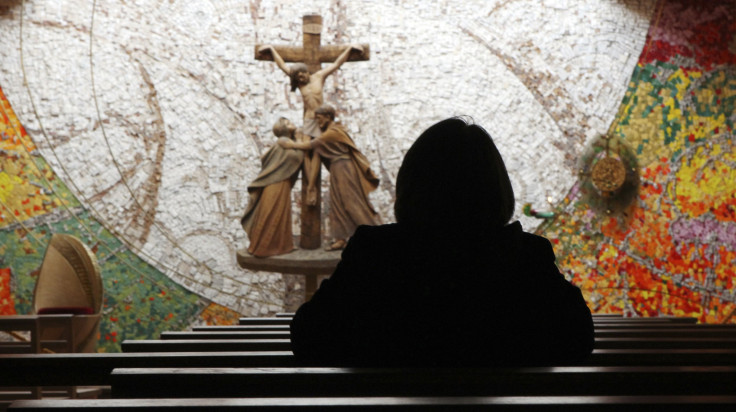Ireland Gay Marriage Vote: Irish Catholic Church Takes A Cue From Pope Francis, Charts New Course Amid Waning Influence

Ireland’s historic same-sex marriage referendum being held on Friday has been framed as a commentary on the waning influence of the Catholic Church, but perhaps no single event has better represented the recent transformation and rejuvenation of the scandal-ridden institution. Regardless of the results of the vote, Ireland will be looking at a new church, humbled in the aftermath of revelations of child sex-abuse but determined to stay relevant by charting a new course, one that some say is modeled on Pope Francis’ efforts to revitalize worldwide Catholicism through an emphasis on compassion and justice.
The referendum, which polls predicted would legalize same-sex marriage with as much as 69 percent of the vote, has underscored the necessity of a new approach by the church, according to Father Seamus Ahearne, a priest in the parish of Finglas outside of Dublin. “Religion and the Catholic Church have almost become irrelevant in people's lives,” he said. “This pompous, pious, arrogant language we've used for so long -- it's wrong. The church has to speak a different kind of language now, reaching into people's hearts.”
Ahearne voted no on Friday to amending the country’s constitution to grant same-sex marriages equal status with those between opposite-sex couples, but he said he would not mind if the bill were legalized. Indeed, he pointed out that nearly 50 percent of the membership of the Association of Catholic Priests, of which he is a member, actually support the legislation. “I think the yes side will win and that's fine. I don't see that as a failure on the part of the Church,” he said. “I think the Church came in fairly gently and came out of this fairly well.”
The Church leadership took a notably low-key approach in the lead-up to the referendum, only expressing its opposition two weeks before the vote and in very cautious terms. Such an approach would have been unthinkable just a few decades ago when church leaders were at the forefront of the debate around the legalization of divorce, which passed very narrowly and as recently as 1995.
Archbishop Diarmuid Martin of Dublin, one of the most important Catholic figures in the country, even refrained from commenting about the position of Catholics supporting the referendum on Friday, with a spokeswoman for Martin saying that it was not his policy “to tell others how to vote.” This reluctance to publicly call on Catholics to back an official line sent an important message, according to the Rev. James Bretzke, a professor of moral theology at Boston College. “This certainly represents a cultural change in the Irish hierarchy's self-understanding of their role in guiding the consciences of the Catholic faithful,” he said.
The transformation of the Church’s approach to addressing these kinds of political issues is a reflection of a certain kind of pragmatism in the face of changing circumstances for the Irish church. “There’s a realpolitik that’s kicked in, and bishops are seriously asking themselves, ‘Is this the hill we want to die on?’ ” said Rocco Palmo, the editor of the widely read Catholic news and politics website Whispers in the Loggia.
While an estimated 84 percent of Ireland’s population identifies as Catholic, the numbers of those who are observant have plummeted, with only about a third attending mass on a weekly basis. The legacy of child abuse scandals has undermined the once-powerful institution’s moral authority, putting it in a position now where the church is “structurally fighting for its life,” according to Palmo.
However, the Church’s cautiousness around issues with broad social support, like equal marriage rights, goes beyond an attempt to avoid alienating the Irish public, Ahearne said. It is also a product of a desire by many priests to transform the institution and become relevant through a new focus on teachings that emphasize compassion and simplicity, along with economic equality, a shift he said echoed what Pope Francis has promoted more broadly. “We have to express ourselves with humility,” he argued. “[Francis] is a man who speaks about ordinary things: about mercy, about love, fun, smiling. Not about condemning this or that. He sees above all the complexity of life, and that matters deeply.”
Ahearne said that this attitude has become increasingly common among priests in Ireland, to the point where it is now “the conventional wisdom.” As a result, he said, a victory for same-sex marriage in Ireland will not be a blow for the church but, rather, the latest reminder that the institution has to find a way to connect to people on a personal, human level that transcends the traditional “narrow” focus on moral issues. “Out of that, I see an evolution for a different church, a church of God, of love.”
© Copyright IBTimes 2024. All rights reserved.






















